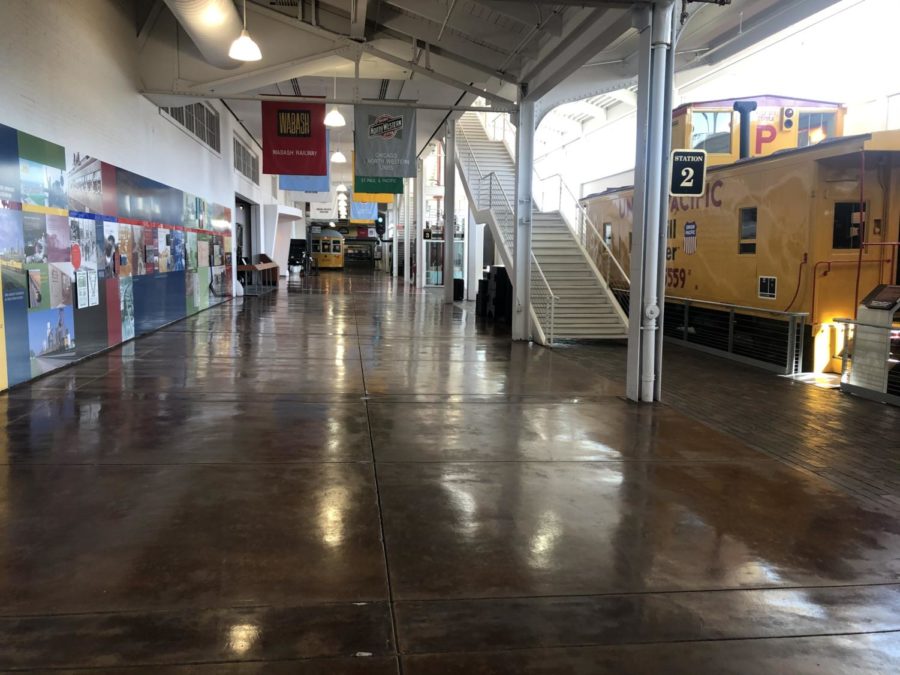Museums matter
It’s important to support museums during the pandemic
The main hall of the Durham Museum, usually filled with visitors, is empty over a year into the pandemic.
April 16, 2021
Restaurants, retail stores and small businesses have become common casualties in the economic stress of the past year. Recent reports suggest that around 60% of the businesses that have closed during the pandemic will never reopen. CBS News predicted that around 9 million small businesses will likely go under during the pandemic. While communities mourn the loss of their favorite local coffee shop, tattoo parlor, theater, food truck or salon, there is one victim of COVID-induced closures that has gone largely unacknowledged: museums.
Since last March, museums have been hit hard. Almost 70% have reported that they’ve cut educational programming, and one-third of locations fear they won’t come back according to a survey from the American Alliance of Museums. Those that have been able to reopen are reaching an average of 35% of pre-pandemic attendance numbers which means that, because museum funding in the U.S. comes largely from ticket sales, museums are being forced to lay off or furlough employees in large numbers.
A recent trip to the Durham Museum reminded me of the role that museums play in communities. They bring people together, preserve our history and help guide us through the future. By connecting people to their heritage and showcasing diverse concepts, they both foster unity in communities and challenge people’s narrow perspectives. Most Americans are likely more concerned about returning to their favorite restaurant, going back to concerts or attending sporting events again, but they shouldn’t overlook the importance of preserving cultural archives.
Museums need support, now more than ever.
At the Durham Museum, which reopened to the general public in August, it’s easy to see that even those lucky enough to reopen have had to make changes. Employees in face masks greet guests at the door and check tickets which, in order to limit the number of people inside, must be reserved in advance. Some areas, like the Photo Archive and the Mutual of Omaha Theater, are temporarily closed. Many interactive exhibits have been roped off while hands-off games like History Hopscotch and ISpy attempt to help visitors stay engaged. To limit the spread of germs, hand sanitizing stations have been placed throughout the building. In a few exhibits, digital presentations that require buttons suggest visitors “try using your elbow on pushbuttons.” Museums are doing everything they can to keep their communities safe while still providing guests with memorable and educational experiences.
There is no better time to visit a museum than right now, especially given the health precautions and protocols that are in place. After over a year of social distancing, museums are a safe way for us to feel connected again. During a time of intense change, they provide an outlet for us to cope with our emotions through education. The future will undoubtedly look different due to the pandemic; museums prove that ordinary things have changed drastically since the beginning of time, but over time, humans have adapted to those changes and preserved remnants of our past to remind us where we came from.
Museums not only display the past but also document the present. The Durham Museum is currently collecting “stories of the pandemic.” They are encouraging people to send letters, pictures and objects to capture the details of the current moment. The opinions and experiences of frontline workers, business owners and the general public will be kept in the Durham’s permanent collection for future generations to learn from. We are experiencing history right now. In order to ensure this critical moment is captured and preserved, we need to keep museums alive.
Most teenagers can probably think of places they would rather be on a Saturday than walking through the halls of a museum. However, despite the common stereotypes, museums are engaging places for all ages, and they have something for everyone. Because most museums are constantly changing out displays and making an effort to keep exhibits versatile, someone who loves modern art can enjoy a trip just as much as someone who has an interest in the medical field. At the Durham Museum, for example, an exhibition entitled “Beyond the Vote” which opened in March explores the impact of the 19th amendment. It features the work of local artists along with historical stories, cartoons, advertisements and photographs. Next door, an exhibit about the guitar showcases dozens of different types of guitars through the lens of history, music and technology. Museums are not just buildings where you look at artifacts in a display case while reading a long-winded plaque about whatever is being showcased. They are versatile, dynamic cultural centers that are worth supporting, no matter what your interests may be.
Museums are more than a destination for field trips; they’re a place for communities to come together and learn about history, society and science. They can change the way you see yourself, your community, your heritage and the world. Take a trip to the local museum if you can or explore an online gallery. It might help you feel more connected to your community or inspire you to look at an issue from another perspective. At such a critical time in history, that matters.







